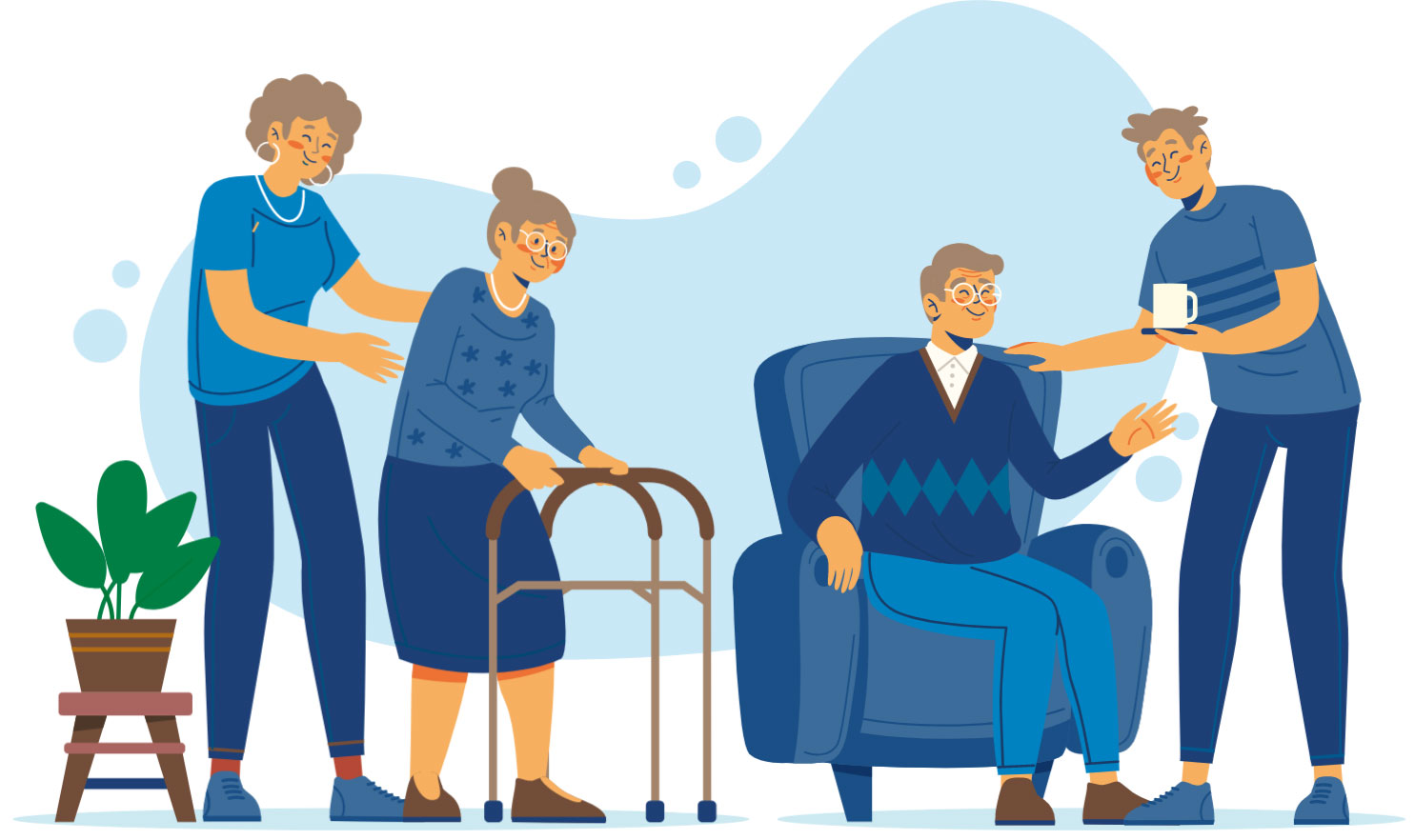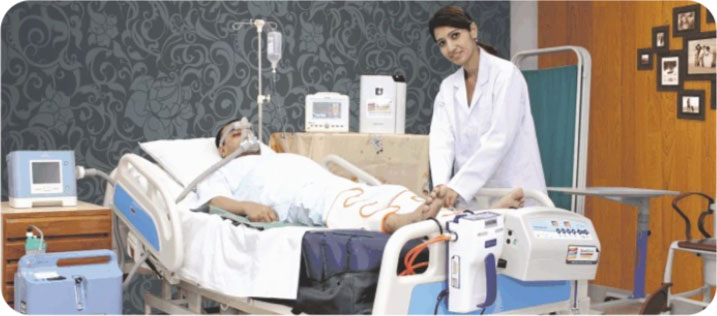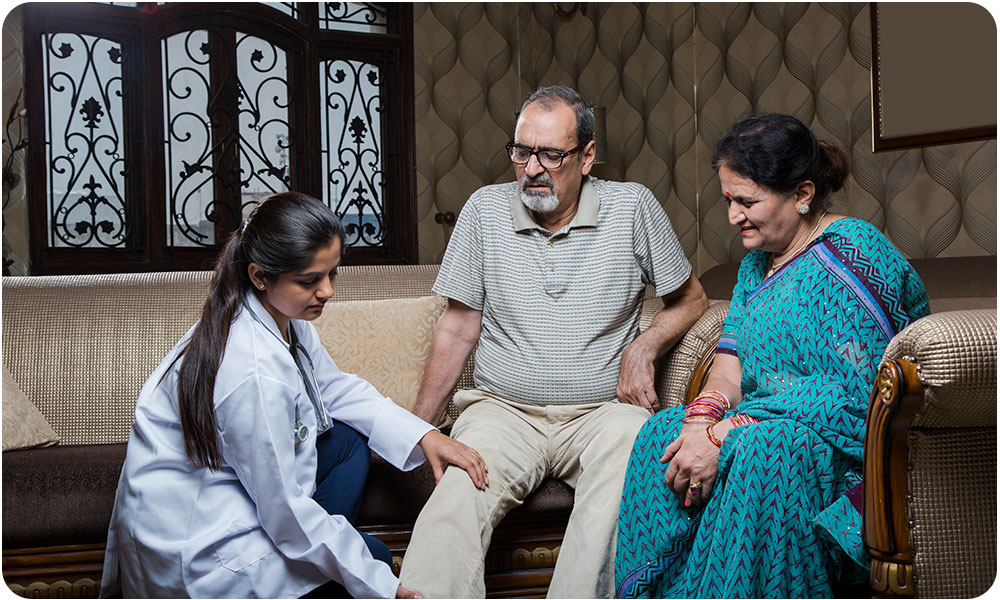An integral part of home care is the home nursing services in Delhi provided by Senocare. It promotes faster healing and a reduced risk of infection. It is also more economical than in hospital care. Being at home, amongst family, helps in boosting the morale of your loved one. Your loved one also benefits from the focused attention and care of such a service. They may become fearful of going to the hospital, hence home nursing services are a probable solution for them.

What home care services does Senocare provide in Delhi?
Senocare provides an array of home services in Delhi which includes
Nursing Care at Home
Senocare hires professionally trained and experienced staff to take care of your loved one, with utmost precision, compassion and awareness. The staff is empathetic, firm and attentive, to ensure overall well being, quick healing and intelligent company.
Attendant Care at Home
Your loved one’s requirements aren’t just confined to medical issues. Senocare has professionally qualified attendants who will look after their daily needs. The team has been personally screened and is well-versed in caring for your loved one.
At home doctor visit
Amidst the rise of uncertainties in the environment, we aim to bring the comfort of a doctor consultation at home. We have in-house doctors, available 24×7, for your loved ones, at the comfort of your home.
What are the different kinds of home nursing care services Senocare offers in Delhi?

- Home nurse for ICU
- Urinary catheterization
- Post-surgical care
- Home care in COVID-19
- Wound care
Why nursing care at home is a good idea


- Setting up for hospital beds and equipment
- Critical(ICU) care at home
- Post Operative care at home
- Chemo therapy at home
- Dementia care at home
- Post Stroke care
- Elderly care
- Wound Management, Dressing care
- IV (Intravenous drugs) administration
- Vital monitoring at home

Why is Senocare considered the best home care service in Delhi
Senocare is the finest in its sector because it focuses on providing high-quality care while also being accountable. We have specially qualified nurses and attendants to look after your loved one’s needs. When it comes to our customers’ satisfaction, we always go beyond.
What our Happy Customers Say
Media Coverage




FAQ on Nursing Care Services in Delhi
-
Q1. What are the charges for Home Nursing Services in Delhi ?
Charges for home nursing services in Delhi May fluctuate as per requirement. They start from Rs 1200/- and can go up, as per the elder’s requirements.
-
Q2. What to expect from an at home Doctor visit ?
Our on call doctor to visit your home, perform necessary tests, prescribe medicines if necessary and inform about the next steps.
-
Q3. Where can we find a trusted Home Nurse in Delhi ?
At Senocare, we personally verify and hire professionally trained nurses and attendants.
-
Q4. How can I know that the caregivers are trustworthy?
Senocare takes full responsibility of providing utmost care along with accountability of the safety and caregiving capability of the staff provided.
-
Q5. What exactly do you have to provide in terms of in-home elder care?
We offer comprehensive home nursing service in Delhi, including both medical and non- medical assistance. Attendant care, home nursing, in-home ICU treatment, rental of medical equipment, and basic purchases are all covered.
-
Q6. Do the nurses / attendants work for you on a regular basis or on a contract basis?
We have a range of nurses and attendants, some on payroll and some on a contract basis.
-
Q7. Do you verify their credentials, and if so, how do you go about doing so?
Our employees are hired after a rigorous background check, police verification, and references.
-
Q8. I'm trying to decide whether to hire a nurse or an attendant; could you help me?
Our senOcare team will provide you with support and assistance based on your specific needs.
-
Q9. What is the cost of hiring an attendant? Is this fixed?
The attendant’s price is set by the patient’s needs and requests under Home nursing service in Delhi.
-
Q10. What are the attendant's services?
Attendants help with the following tasks:
- Assisting with WC, bedpan, urinals, catheters
- Repositioning bed-bound patients to assist prevent bed sores
- Assisting with oral medication
- Assisting with light workouts
- Walking assistance
- Bathing assistance
- Clothing assistance
- Brushing teeth and denture care
- Diaper change
-
Q11. In terms of elder care, what is the difference between the services of an attendant and a nurse?
- IV cannula care
- IM administration
- Oxygen administration
- Tracheostomy care
- Wound dressing
- Injection
- Insulin administration
Are all included in the services that are provided by the nurse, whereas the services that are provided by the attendants are answered in the previous question.
-
Q12. What if the attendant's services aren't to our liking?
Home nursing service in Delhi provides you the opportunity to change your attendant if the patient is dissatisfied.
-
Q13. What happens if the attendant leaves in the middle of the meal for some reason?
If the situation worsens, a replacement attendant will be assigned to you as quickly as possible.
-
Q14. Where else do you provide senOcare services besides Hyderabad?
-
Q15. Are your nurses competent to provide post-operative home care?
Yes, our nurses can provide post-operative home care.
Reach Out To Us
JMD Regent Square MG Road,
Gurgaon Haryana 122002

